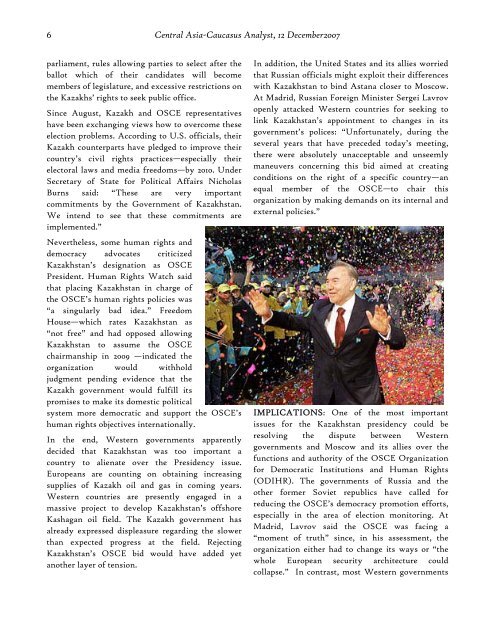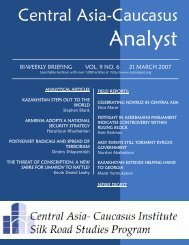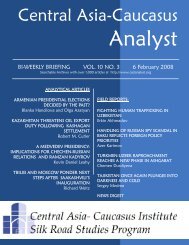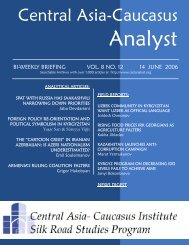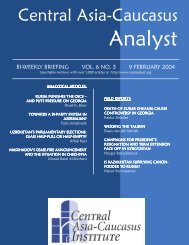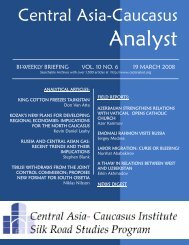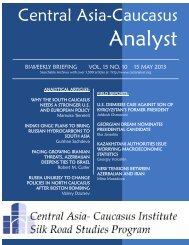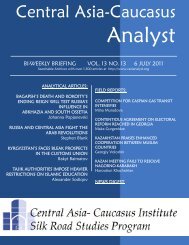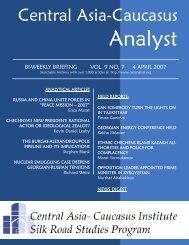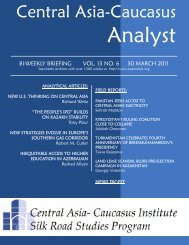6<strong>Central</strong> <strong>Asia</strong>-<strong>Caucasus</strong> <strong>Analyst</strong>, 12 December2007parliament, rules allowing parties to select after theballot which of their candidates will becomemembers of legislature, and excessive restrictions onthe Kazakhs’ rights to seek public office.Since August, Kazakh and OSCE representativeshave been exchanging views how to overcome theseelection problems. According to U.S. officials, theirKazakh counterparts have pledged to improve theircountry’s civil rights practices—especially theirelectoral laws and media freedoms—by 2010. UnderSecretary of State for Political Affairs NicholasBurns said: “<strong>The</strong>se are very importantcommitments by the Government of Kazakhstan.We intend to see that these commitments areimplemented.”Nevertheless, some human rights anddemocracy advocates criticizedKazakhstan’s designation as OSCEPresident. Human Rights Watch saidthat placing Kazakhstan in charge ofthe OSCE’s human rights policies was“a singularly bad idea.” FreedomHouse—which rates Kazakhstan as“not free” and had opposed allowingKazakhstan to assume the OSCEchairmanship in 2009 —indicated theorganization would withholdjudgment pending evidence that theKazakh government would fulfill itspromises to make its domestic politicalsystem more democratic and support the OSCE’shuman rights objectives internationally.In the end, Western governments apparentlydecided that Kazakhstan was too important acountry to alienate over the Presidency issue.Europeans are counting on obtaining increasingsupplies of Kazakh oil and gas in coming years.Western countries are presently engaged in amassive project to develop Kazakhstan’s offshoreKashagan oil field. <strong>The</strong> Kazakh government hasalready expressed displeasure regarding the slowerthan expected progress at the field. RejectingKazakhstan’s OSCE bid would have added yetanother layer of tension.In addition, the United States and its allies worriedthat Russian officials might exploit their differenceswith Kazakhstan to bind Astana closer to Moscow.At Madrid, Russian Foreign Minister Sergei Lavrovopenly attacked Western countries for seeking tolink Kazakhstan’s appointment to changes in itsgovernment’s polices: “Unfortunately, during theseveral years that have preceded today’s meeting,there were absolutely unacceptable and unseemlymaneuvers concerning this bid aimed at creatingconditions on the right of a specific country—anequal member of the OSCE—to chair thisorganization by making demands on its internal andexternal policies.”IMPLICATIONS: One of the most importantissues for the Kazakhstan presidency could beresolving the dispute between Westerngovernments and Moscow and its allies over thefunctions and authority of the OSCE Organizationfor Democratic Institutions and Human Rights(ODIHR). <strong>The</strong> governments of Russia and theother former Soviet republics have called forreducing the OSCE’s democracy promotion efforts,especially in the area of election monitoring. AtMadrid, Lavrov said the OSCE was facing a“moment of truth” since, in his assessment, theorganization either had to change its ways or “thewhole European security architecture couldcollapse.” In contrast, most Western governments
<strong>Central</strong> <strong>Asia</strong>-<strong>Caucasus</strong> <strong>Analyst</strong>, 12 December 2007 7urge the OSCE to continue strong efforts topromote democracy and human rights in the formerSoviet Union, where these values are seen asgravely threatened.Foreign Minister Tazhin released a statementaffirming Kazakhstan’s support for ODIHR,including its mandate and operations. Yet, he addedthat Kazakhstan, whose next nationwide electionsare scheduled for 2012, plans to work with all OSCEmembers to achieve a clear understanding of thecriteria and standards ODIHR should use inassessing elections throughout the OSCE region.This formulation suggests an openness in principleto revising OHDIR’s activities. Russian officialslikely will perceive Kazakhstan’s chairmanship asan opportunity to advance their OSCE “reforms” ina favorable institutional environment, but theOSCE’s consensus decision-making rules wouldallow any government to veto proposed changesaffecting ODIHR.In addition, the appointment of a <strong>Central</strong> <strong>Asia</strong>ncountry to the Presidency of the OSCE could helpstrengthen the organization’s currently beleagueredposition in several of the former Soviet republics.Burns applauded Kazakhstan’s appointment as“recognition by the rest of us that this organizationis more than just about West Europeans andAmericans. It’s about the people who live in <strong>Central</strong><strong>Asia</strong>, the <strong>Caucasus</strong> and the Balkans, as well. So,symbolically it’s important.”Another of Kazakhstan’s priority for the OSCEcould become reinforcing the organization’scommitment to developing transit andtransportation corridors linking the <strong>Central</strong> <strong>Asia</strong>ncountries with one another and other OSCEmembers. Kazakhstan’s strong economicperformance in recent years, which has been partlydue to high global prices for its energy exports, hasled Astana to become one of the leading proponentsof Eurasian economic integration.Conversely, Kazakhstan may also play a role inshaping the OSCE’s new initiative, launched at theMadrid summit, to curb the trafficking of narcotics,weapons, and people across the Afghan-Tajikborder. For example, the Ministerial Councildecided to expand an OSCE project, which beganearlier in November, designed to aid Afghancounternarcotics officers by allowing agents fromAfghanistan’s <strong>Central</strong> <strong>Asia</strong>n neighbors toparticipate. <strong>The</strong> OSCE’s current Chairman-in-Office, Spanish Foreign Minister Miguel AngelMoratinos, told a press conference that, “With thisnew contribution . . . we hope to bolster our securityand we acknowledge the link between OSCEcountries and the problems and challenges whichexist in Afghanistan.”<strong>The</strong> two processes of economic integration andborder security are intimately related. <strong>Central</strong> <strong>Asia</strong>ngovernments will remain reluctant to relax theirborder controls, which impede regional commerce,if they fear transnational criminal organizationswould exploit the opportunity for illicit purposes.CONLUSIONS: At the end of the Madrid session,Moratinos called on the member governments toconvene a summit of their heads of state to resolvethe stark differences that have divided the membersin recent years. Some OSCE members hope thatsuch a high-level gathering might be able to achievea comprehensive settlement that would deal withthe complex interlinking issues of the future ofOHDIR, the Conventional Forces in EuropeTreaty, the Minsk process seeking a negotiatedsolution to the conflict between Azerbaijan andArmenia over Nagorno-Karabakh, and otherdisputes. Given the time required to organize such ameeting among the contentious participants, Astanacould well have the honor of hosting the first suchgathering since the 1999 OSCE summit in Istanbul.AUTHOR’S BIO: Richard Weitz is Directorfor Project Management and a Senior Fellow atthe Hudson institute.
- Page 1: Central Asia-CaucasusAnalystBI-WEEK
- Page 4 and 5: THE CENTRAL ASIA-CAUCASUS ANALYSTEd
- Page 6 and 7: 4Central Asia-Caucasus Analyst, 12
- Page 10 and 11: 8Central Asia-Caucasus Analyst, 12
- Page 12 and 13: 10Central Asia-Caucasus Analyst, 12
- Page 14 and 15: 12Central Asia-Caucasus Analyst, 12
- Page 16 and 17: 14Central Asia-Caucasus Analyst, 12
- Page 18 and 19: 16Central Asia-Caucasus Analyst, 12
- Page 20 and 21: 18Central Asia-Caucasus Analyst, 12
- Page 22 and 23: 20Central Asia-Caucasus Analyst, 12
- Page 24 and 25: 22Central Asia-Caucasus Analyst, 12
- Page 26 and 27: 24Central Asia-Caucasus Analyst, 12
- Page 28 and 29: 26Central Asia-Caucasus Analyst, 12
- Page 30: 28Central Asia-Caucasus Analyst, 12


